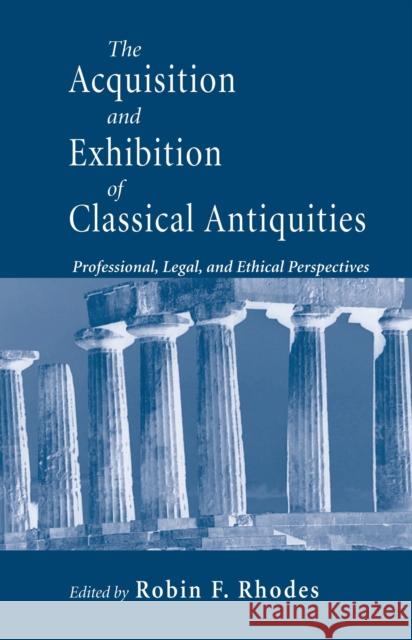The Acquisition and Exhibition of Classical Antiquities: Professional, Legal, and Ethical Perspectives » książka
The Acquisition and Exhibition of Classical Antiquities: Professional, Legal, and Ethical Perspectives
ISBN-13: 9780268040277 / Angielski / Miękka / 2008 / 188 str.
The Acquisition and Exhibition of Classical Antiquities: Professional, Legal, and Ethical Perspectives
ISBN-13: 9780268040277 / Angielski / Miękka / 2008 / 188 str.
(netto: 92,67 VAT: 5%)
Najniższa cena z 30 dni: 91,69
ok. 30 dni roboczych
Bez gwarancji dostawy przed świętami
Darmowa dostawa!
Cultural property and its stewardship have long been concerns of museums, archaeologists, art historians, and nations, but recently the legal and political consequences of collecting antiquities have also attracted broad media attention. This has been the result, in part, of several high-profile trials, as well as demands by various governments for the return of antiquities to their countries of origin.These circumstances call out for public discussion that moves beyond the rather clear-cut moral response to looting, to consider the implications of buying, selling, and exhibiting antiquities. To whom should they belong? What constitutes legal ownership of antiquities? What laws govern their importation into the United States, for instance? What circumstances, if any, demand the return of those antiquities to their countries of origin? Is there a consensus among archaeologists and museum directors about these issues?These and other pertinent issues are addressed in the essays and responses collected in this volume. Delivered at a 2007 symposium by eminent museum directors and curators, legal scholars, archaeologists, and historians and practitioners of art and architecture, these papers comprise a rich and nuanced reference work. Robin Rhodes' new volume presents a rich collection of essays with multiple perspectives on ethical questions surrounding the ownership of cultural property and the acquisition of antiquities. Directors of large and small museums, lawyers specialized in U.S. and international law, art historians, curators, and field archaeologists address these topics from their own points of view. The result is as rewarding as it is timely. Mary Sturgeon, University of North Carolina at Chapel Hill." . . One simple unseemly truth: collecting antiquities promotes the destruction of world heritage. I was fascinated by these chapters, and Rhodes has done archaeology a service in publishing this book. The elegant arguments of the archaeologists deserve a wide readership, particularly among Americancollectors.Until they understand what devastation they unwittingly promote, we can only weep for our stolen history." Jack Davis, Director, American School of Classical Studies at Athens ." . . A welcome addition to an ever burgeoning bibliography on the ethics and legal issues in the antiquities trade. There are many essays here that are up-to-date and easily accessible to any interested reader, because they are largely written in the conversational style with which they were delivered. Many viewpoints are expressed and several essays show how the ground is shifting as museums re-write policies to take into account new legal realities, especially internationally, while archaeologists, anthropologists, art historians, and legal professionals show an increasingly more sophisticated understanding of the many dimensions of illicit excavation and the acquisition of illicit property." James C. Wright, Bryn Mawr College"











